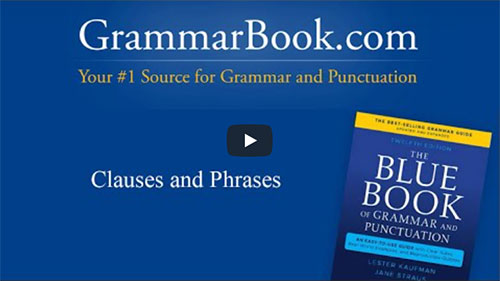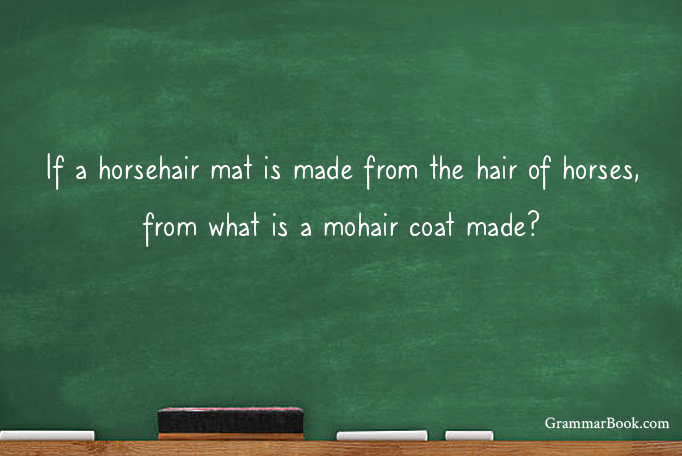|
Having trouble viewing this message? Click here to view it online.
To unsubscribe or change contact details, scroll to the bottom and follow the link.
|



|
|
Becoming Savvy with Sentence Structures: Part One
|
|
The art of writing resembles any trade that begins with the basics and evolves into skillful applications of them. A key component of precise and eloquent composition is understanding sentence structures.
English comprises four foundational sentence constructions: simple, compound, complex, and compound-complex. In part one of our discussion, we'll review simple and compound sentences.
Simple Sentence
A simple sentence has one subject and one verb. It does not have a dependent (subordinate) clause, one that cannot stand alone as a sentence (e.g., when the boys return). Simple sentences also may include parts of speech such as direct and indirect objects, adjectives, adverbs, and infinitive and prepositional phrases.
Dogs (subject) bark (verb).
Regina (subject) gave (verb) her sister (indirect object) a card (direct object).
Antonio (subject) painted (verb) his old bike (direct object) red (adjective) yesterday (adverb).
Inga's brown dog (subject) likes (verb) to sleep (infinitive phrase) on his side (prepositional phrase). |
The subject (indicated by a single underline in the three sentences that follow), the verb (bold), or both may be compound in a simple sentence:
The moon and the stars came into view.
The pitcher threw six innings and hit a double.
The king and the queen each raised a hand and waved. |
We can change syntactical positions in a simple sentence:
Above the law they are not.
There was no response to the question. (In this sentence, the word there is an expletive, a filler word for emphasizing the phrase no response to the question; without the expletive, the simple sentence would be No response to the question was given.)
Her parting glare he ignored. |
Simple sentences can be further categorized as statements, commands, requests, questions, and exclamations:
Statement: You write well.
Command: Write well.
Request: Would you please write well?
Question: Do you write well?
Exclamation: You write well! |
Compound Sentence
A compound sentence has at least two main (i.e., independent) clauses joined by a conjunction and a comma or by a semicolon:
Antonio painted his old bike red yesterday, and he will paint his scooter the same color tomorrow.
She writes well, but she is still improving at math.
The dreams of my youth have passed; the hopes of my future await.
For strong technique, we want to avoid compound sentences with loose and protracted constructions. This can sometimes happen when we string multiple clauses together.
Loose/Protracted: Angelique went to the store, and then she stopped at the post office, and next she picked up the kids.
Better (simple sentence with a compound predicate, i.e., verb or verb phrase): Angelique went to the store, stopped at the post office, and picked up the kids.
Loose/Protracted: The book was on the table, and Jason saw it, and he picked it up and started reading it.
Better (two independent clauses joined by a semicolon): Jason saw the book on the table; he picked it up and started reading it.
Loose/Protracted: They owned the team, and they were ambitious people, and they invested profits back into the franchise.
Better (consolidated simple sentence): The ambitious team owners invested profits back into the franchise. |
In Part Two of "Becoming Savvy with Sentence Structures," we will explore how to recognize and use complex and compound-complex sentences. Also watch for Part Three, in which we'll look at how to apply the four sentence types to achieve style and effect in our writing.
|
View and comment on this
article on our website.
|
|
|

|
Pop Quiz
Using what you've learned in this article, identify whether each example is a simple sentence or a compound sentence.
1. I want to learn how to play the piano this year.
a. Simple
b. Compound
2. Next to greatness they will be, and behind mediocrity they will be not.
a. Simple
b. Compound
3. The jury has convened; the hour of decision is near.
a. Simple
b. Compound
4. Make sure you get to school on time!
a. Simple
b. Compound
|
 |
The Blue Book of Grammar and Punctuation
by Lester Kaufman and Jane Straus |
The Authority on English Grammar! Twelfth Edition Now Available
An indispensable tool for busy professionals, teachers, students, homeschool families, editors, writers, and proofreaders.
Available in print AND as an e-Book! Over 2,000 copies are purchased every month!
To order the book, simply click the link to order the book from the GrammarBook.com website.
|
Get Even More Useful Grammar Tips
In addition to our weekly newsletter, we post new entries about American English grammar. The following is our most recent article. Bookmark our GrammarBook blog and be sure to check it often.
Is it Spelt or Spelled
|
Free BONUS Quiz for You!
Friend, because you are a subscriber to the newsletter, you get access to one of the Subscribers-Only Quizzes. Click here to take a Spelling Quiz and get your scores and explanations instantly!
We will be adding many more quizzes this year to our already substantial list of them. If you have suggestions for topics we have not yet covered, please send us a message at help@grammarbook.com.
|
Hundreds of Additional Quizzes
at Your Fingertips
Subscribe now to receive hundreds of additional English usage quizzes not found anywhere else!
Teachers and Employers
Save hours of valuable time! You may assign quizzes to your students and employees and have their scores tallied, organized, and reported to you! Let GrammarBook.com take the hassle out of teaching English!
"Fun to test my skills."
"The explanations really help ... thanks!"
"I can select the quizzes to assign to my students, and then the results are reported to me automatically!"
99¢
QUIZZES
|
Don't need all the quizzes?
You can now purchase the same quizzes individually for ONLY 99¢ each.
Purchase yours here.
|
If you think you have found an error in a quiz, please email us at help@grammarbook.com
|
Wordplay

Pop Quiz Answers
1. I want to learn to play the piano this year.
a. Simple (The sentence has a subject, a verb, and a direct object, the infinitive phrase to learn to play the piano this year.)
2. Next to greatness they will be, and behind mediocrity they will be not.
b. Compound (The sentence has two independent clauses joined by a comma and the coordinating conjunction and.)
3. The jury has convened; the hour of decision is near.
b. Compound (The sentence has two independent clauses joined by a semicolon.)
4. Make sure you get to school on time!
a. Simple (The sentence has a subject, the understood you; a verb; and a direct object, the verb phrase get to school on time. This simple sentence is a command.)
|
 |
English In A Snap:
68 One-Minute English Usage Videos FREE |
Learn all about who and whom, affect and effect, subjects and verbs, adjectives and adverbs, commas, semicolons, quotation marks, and much more by just sitting back and enjoying these easy-to-follow lessons. Share them with your colleagues (and boss), children, teachers, and friends as well! Click here to watch.
|
|